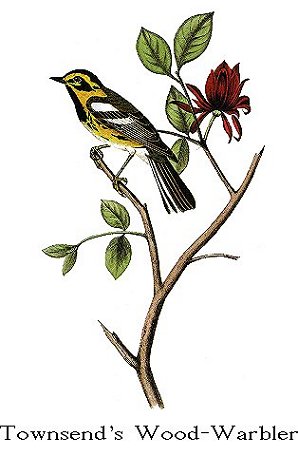
| Family VIII. SYLVICOLINAE. WOOD-WARBLERS. GENUS II. SYLVICOLA, Swains. WOOD-WARBLER. |
Next >> |

Family |
TOWNSEND'S WOOD-WARBLER. [Townsend's Warbler.] |
| Genus | SYLVICOLA TOWNSENDI, Nuttall. [Dendroica townsendi.] |
Mr. NUTTALL has honoured this beautiful Warbler with the name of his friend
and companion Mr. TOWNSEND. It was procured about the Columbia river. All the
information respecting it that I possess is contained in the following brief
notice by the former of these celebrated naturalists. "Of this fine species we
know very little, it being one of those transient visiters, which, on their way
to the north, merely stop a few days to feed and recruit, previous to their
arrival in the higher latitudes, or afterwards disperse in pairs, and are lost
sight of till the returning wants and famine of the season impel them again to
migrate, when, falling on the same path, they are seen in small silent flocks
advancing toward the retreat they seek out for their temporary residence. As
this species frequents the upper parts of the lofty firs, it was almost an
accident to obtain it at all. The female remains unknown."
The plant represented, Calycanthus floridus, the Carolina allspice, is
much esteemed on account of the fragrance of its large purple flowers, and
abounds in the Southern States, growing on the margins of swamps and rivulets.
SYLVIA TOWNSENDI, Townsend's Warbler, Towns., Jour. Acad. Nat. Sc.
Philadelphia, vol. vii. p. 191.
TOWNSEND'S WARBLER, Sylvia Townsendi, Aud. Orn. Biog., vol. v. p. 36.
Wings of moderate length, rather pointed, with the second and third quills
longest, the first and second nearly equal and very little shorter; tail
scarcely emarginate. Upper parts light greenish-olive, more yellow behind, all
the feathers dusky in the centre; cheeks, ear-coverts, and throat black; a band
over the eye, a broader band on the side of the neck, and the fore part of the
breast bright yellow; the rest of the lower parts white, but the sides marked
with oblong dusky spots; wings blackish-brown; the secondary coverts and first
row of small coverts largely tipped with white, the quills margined with light
grey; tail-feathers blackish-brown, edged with grey; outer two on each side
almost entirely white, the next with a small white spot.
Male, 4 10/12, wing 2 8/12.
Columbia river, northward. Migratory.
| Next >> |